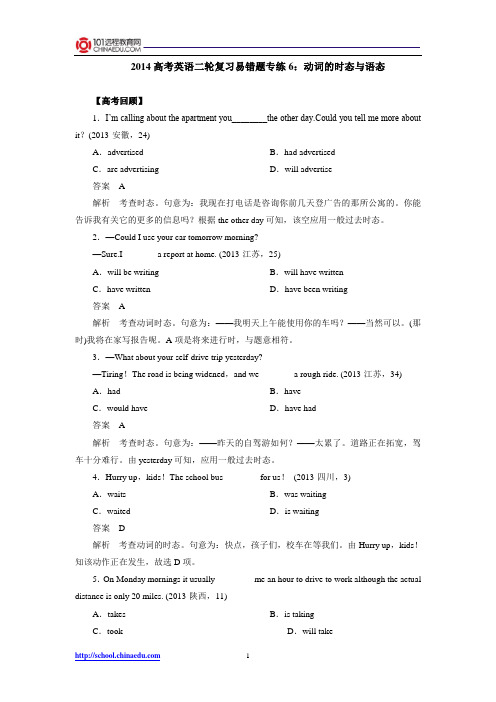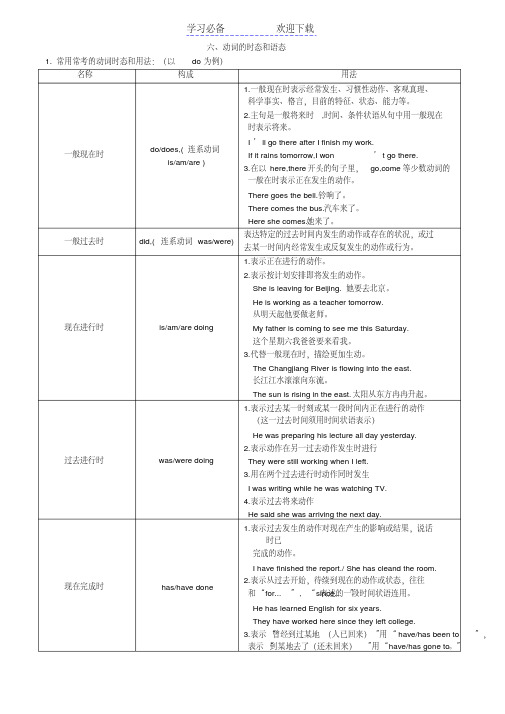【名师名校典型题】2014高考英语二轮复习名师知识点总结:动词时态和语态
- 格式:doc
- 大小:56.50 KB
- 文档页数:8

高考二轮专题复习语法资料精品集之动词时态语态毫无疑问,动词的时态和语态是是高中英语的重要语法点,更是历年高考的考查热点。
同学们在复习这一语言点时应注意:1、考纲要求的动词的时态和语态的基本用法;2、易混时态用法比较;3、根据固定时间状语、固定句型确定时态的情况;4、主动形式表被动意义的情况;5、不用被动语态的情况。
通过分析近年的全国高考试题可以预测2012年高考对动词的时态和语态的考查依然会注重在具体语境中考查动词的时态和语态的运用。
英语动词时态变化从时间上可划分为“现在时”,“过去时”,“将来时”和“过去将来时”四大类,每类又包括“一般式”、“进行式”、“完成式”和“完成进行式”四式,共十六种时态形式。
其中常用的有十种:一般现在时、一般过去时、一般将来时、过去将来时、现在进行时、过去进行时、现在完成时、过去完成时、将来完成时、现在完成进行时等十种。
英语的语态分为主动语态和被动语态。
主动语态表示主语是动作的执行者,被动语态表示主语是动作的承受者。
几种基本事态的基本用法⒈一般现在时:构成:主语+ 动词原形或第三人称单数形式用法:1)、经常性或习惯性的动作,常与usually, always, sometimes, every day, frequently 等一起使用。
He always help others in his spare time.2)、现在存在的状态或具有的特征China is a great socialist country.3)、客观规律、正确事实或科学真理、格言以及其他不受时间限制的客观存在(10上海)28. Every few years, the coal workers their lungs X-rayed to ensure their health.A. are havingB. haveC. have hadD. had had4)、表示安排或计划要做的动作(句中常有表示未来时间的状语),主要用于begin, come, leave, go, arrive, start, stop, open, close等瞬间动词。


2014高考英语二轮复习易错题专练6:动词的时态与语态【高考回顾】1.I’m calling about the apartment you________the other day.Could you tell me more about it?(2013·安徽,24)A.advertised B.had advertisedC.are advertising D.will advertise答案 A解析考查时态。
句意为:我现在打电话是咨询你前几天登广告的那所公寓的。
你能告诉我有关它的更多的信息吗?根据the other day可知,该空应用一般过去时态。
2.—Could I use your car tomorrow morning?—Sure.I________a report at home. (2013·江苏,25)A.will be writing B.will have writtenC.have written D.have been writing答案A解析考查动词时态。
句意为:——我明天上午能使用你的车吗?——当然可以。
(那时)我将在家写报告呢。
A项是将来进行时,与题意相符。
3.—What about your self-drive trip yesterday?—Tiring!The road is being widened,and we________a rough ride. (2013·江苏,34)A.had B.haveC.would have D.have had答案A解析考查时态。
句意为:——昨天的自驾游如何?——太累了。
道路正在拓宽,驾车十分难行。
由yesterday可知,应用一般过去时态。
4.Hurry up,kids!The school bus ________for us!(2013·四川,3)A.waits B.was waitingC.waited D.is waiting答案 D解析考查动词的时态。

时态 用法 例句 一般现现在经常动作/现状/客观He gets up early every day.时态构成(主动) (被动) 常见搭配词 一般现在时do/does is +done every day, every year, often, usually 一般过去时did was+done last year, last Friday, in the past, two days ago, just now ,in1996 现在进行时is doing is being +done now, at present, this week, these days 过去进行时was doing was+being done at 8 yesterday, at this time yesterday,含when he came in 等的主句 将来进行时will be doing (will be being +done) at 8 tomorrow, at this time tomorrow, 含when he arrives in sp 等的主句 现在完成时 have done (would be being +done) by now, up to now, up till now, so far. for+时间段,次数等 in the last/past +时间段This is the +次数+that 从句;This is +最高级+that 从句含since +过去时间的主句。
5. already,yet( ),recently,just, this morning, this year ,ever ,never 等过去完成时 had done had been+done 1.by+过去的时间,时间段+before ,before+过去的时间点, had hardlydone …when;had no sooner done …than 等。


动词的时态和语态【考纲解读】根据考试大纲要求,考生能在真实语境中正确使用各种时态和语态。
根据英语考试大纲要求,考生需掌握其中八种动词时态:一般现在时、一般过去时、一般将来时、现在进行时、过去进行时、现在完成时、过去完成时、过去将来时。
要掌握各种时态之间的区别:一般过去时和现在完成时;过去完成时和一般过去时;一般过去时和过去进行时;现在完成时和现在完成进行时等。
同时,要掌握主动语态表被动意义的运用。
【考点纵横】【考题导引】1.(2015湖南)He must have sensed that I _______(look) at him. He suddenly glanced at me and said quietly, “Why are you staring at me like that?”解析:was looking 根据句子的时态和“Why are you staring at me like that?”可知,此处应用过去进行时。
2.(2016全国Ⅱ改错)Some classmates suggest we go to places of interest nearby. I thought that it is a good idea.__________解析:thought改为think 陈述现在的情况,用一般现在时。
3.(2016天津)When walking down the street, I came across David, whom I ____________(see) for years.解析:hadn’t seen句意:当沿着街道散步的时候,我遇见了多年未见的David。
根据语境可知,定语从句中的动作发生在come across之前,是过去的过去发生的动作,故用过去完成时。
4.(2015浙江)Albert Einstein was born in 1879.As a child, few people guessed that he ___________(go) to be a famous scientist whose theories would change the world.解析:was going 由语境可知,此处表示“从过去看将来”,用was / were going to do。
2014年高考英语第二轮热点专题复习——动词的时态和语态内容解读1.高考考查的八种动词时态是:①一般现在时;②一般过去时;③一般将来时;④现在进行时;⑤过去进行时;⑥现在完成时;⑦过去完成时;⑧过去将来时。
2.容易混淆的三组动词时态是:①一般过去时和现在完成时;②一般过去时和过去完成时;③过去完成时与现在完成时。
3.各种时态及含情态动词的被动形式和应用。
能力解读1.了解动词时态的时、体概念;2.了解常考八种时态的基本用法并能够在真实的情景中恰当使用八种时态进行交际;3.能够区别容易混淆的时态的用法;4.掌握各种时态及含情态动词的被动语态的形式和应用;①分清动词的词性,熟悉并掌握常见的不及物动词happen, take place, occur, exist 等,它们不能用被动语态;②分清主语与谓语之间的关系;③变被动语态的动词一般为及物动词,但有些不及物动词与介词所形成的短语动词也可有被动形式,此时,变被动语态后介词不能丢;④熟悉并掌握主动形式表被动意义的情况。
规律方法1.试题的立意由简单直接的“结构立意”(如状语从句、宾语从句等)转向了“情景立意”。
试题创设的语境明确,交际情景(对话形式占有一定比例)多是发生在学生学习或日常生活中的真实情况。
这样的情景设置实质上是对语法知识、语义理解和语言交际能力的综合考查,体现了高考试题由“知识立意”向“能力立意”转变人命题原则。
2.题干中的有效信息由“外显的”转向“隐藏的”。
3.试题的设问多以中学生普遍感到难以把握的几组时态来相互干扰。
命题趋势毫无疑问,对于动词时态的考查仍交进高考的测试重点。
试题将继续呈现“情景立意”和“能力立意”的原则,即在考查固定句式中的时态和语态的同时,注重在上下文中考查时态和语态,注重在语境中考查时态和语态。
突破方法1.学习动词的时态和语态时,切不可脱离实际运用的语言,一味死记硬背语法规则的条条框框。
了解了八种时态的一些常见规则之后,要留心以英语为母语者在实际生活中是如何使用各种时态的语态的。
动词的时态和语态是历年高考英语测试的重中之重,一般占1—2道题。
命题思路有三:一是直接给出标志性时间状语,考生能依据所给时间状语作出选择;二是给出时间状语,但所给时间状语有着较强的干扰性,考生不能直接根据时间状语作出选择,需要结合语境判断;三是没有任何时间状语,需要借助于上下文语境,才能作出正确判断。
考生应熟知常用时态和被动语态的构成及用法。
高考题往往不会涉及单一的时态语态,而是更多地侧重于时态的交叉使用和呼应及与语态的结合使用。
所以解题时一定要结合语境,弄清时间的先后关系,可根据不同情况采取“找标法”(寻找时间标志词)、“呼应法”(主从句时态呼应)、“搭配法”(固定搭配)、“语境法”等解题技巧。
一?识别标志词如果题干中有标志性的时间状语,则往往可以根据时间状语选择相应的时态?[例]①More than a dozen students in that school ________ abroad to study medicine last year.A. sentB. were sentC. had sentD. had been sent[解析] 此题有明显的时间标志词last year,提示我们应该使用一般过去时;句中的主语students是被送的对象,应该使用被动语态?答案为B?动词的时态一般都有其相应的时间状语,请同学们熟记下列8种常用时态所对应的时间状语?(1)一般现在时:often, always, usually, seldom, now, every day等?(2)一般过去时:then, yesterday, last week, after that, ago, in the following/next few months等?(3)现在进行时:now, right now, at present, at this moment, these days等?(4)过去进行时:then, at that time, at this time yesterday等?(5)现在完成时: recently, lately, up to/till now, so far, in the past/last few months/years…, for+一段时间, since + 一点时间等?(6)过去完成时:befo re, by the end of last month/years…等?(7)一般将来时:tomorrow, today, next week/month…, in an hour, in the coming/following few weeks等?(8)过去将来时:the following month, the next week等?[命题角度及对策]高考测试动词时态须与句中时间状语一致时,常在题干中加入具体情景,以测试考生对动词时态知识的实际运用能力?敏锐捕捉时间标志词,并结合具体的语境,选择出正确的动词时态,是解决此类问题的良策?二?主从时态须呼应如果所给题干是主从复合句,可根据主从句时态呼应的原则选出正确的时态?命题角度及对策]近年来高考考查主从句的时态呼应时,常放在真实的并且符合实际的语境中进行考查?在根据时态呼应原则解题时,要把握好以下几点:(1)在时间?条件等状语从句中,用一般现在时表示一般将来时,一般过去时表示过去将来时,用现在完成时表示将来完成时?(2)正确认定主句动词及从句动词两个动作发生的时间,并认真体会命题者所给出的语境?(3)解答宾语从句与主句时态呼应题时,考生应熟知以下规则:主句动词为现在时,则从句动词可根据需要使用任何时态;主句动词为过去时,则从句动词须用恰当的过去的某种时态(表示客观真理时使用一般现在时)?三?仔细体会语境近年来高考试题对时态语态考查的要求越来越高,大部分试题趋向情境化?实际化?因此,仔细体会所给语境,根据具体语境选择合适的时态是考生需要重点解决的问题?例:—Do you think we should accept that offer?—Yes,we should,for we______ such bad luck up till now,and time______ out.A. have had;is runningB. had;is runningC. have;has been runD. have had;has been run【答案解析】 A。
由时间标志词up till now知道,动作是从过去延续到现在,所以第一空要用现在完成时;而根据语境可知时间快要耗光了,所以第二空要用进行时表将来。
—Can you tell me the timetable of the__________school bus?—Well, the bus__________here for the __________campus at 7:00 A.m..A.will leaveB.leftC.is leavingD.leaves【答案解析】 D。
考查时态,“校班车的时间表”是规定好的事情,表示一般性动作用一般现在时。
【精选试题】名校模拟题及其答案1. —What’s that terrible noise ? — The neighbors _____ for a party.A. have preparedB. are preparingC. prepareD. will prepare2. Now that she is out of a job, Lucy _____ going back to school, but she hasn’t decided yet.A. had consideredB. has been consideringC. has been completedD. is going to consider3. The mayor of Beijing says that all construction work for the Beijing Olympics _____ by 2006.A. has been completedB. has completedC. will have been completedD. will have completed4. Selecting a mobile phone for personal use is no easy task because technology ____ so rapidly.A. is changingB. has changedC. will have changedD. will change5. I _____ Ping –pong quite well, but I haven’t had time to play since the new year.A. playedB. will playC. have playedD. play6. Visitors ______ not to touch the exhibits.A. will requestB. requestC. are requestingD. are requested7. John and I _____ friends for eight years. We first got to know each other at a Christmas party. But we _____ each other a couple of times before that.A. had been; have seenB. have been; have seenC. had been; had seenD. have been; had seen8. This is Ted’s photo. We miss him a lot. He ______ trying to save a child in the earthquake.A. killedB. is killedC. was killedD. was killing9. — How are the team playing ?— They are playing well, but one of them _____ hurt.A. gotB. getsC. areD. were10. —You haven’t said a word about my new coua, Brenda. Do you like it ?—I’m sorry, I _____ anything about it sooner. I certainly think it’s pretty on you.A. wasn’t sayingB. don’t sayC. won’t sayD. didn’t say11. I wonder why Jenny ____ us recently. We should have heard from her by now.A. hasn’t writtenB. doesn’t writeC. won’t writeD. hadn’t writt en12. My uncle ______ until he was forty –five.A. marriedB. didn’t marryC. was not marryingD. would marry13. — When will you come to see me, Dad ?— I will go to see you when you _____ the training course.A. will have finishedB. will finishC. are finishingD. finish14. — How long _____ at this job ?— Since 1990A. were you cmployedB. have you been employedC. had you been employedD. will you be employed15. With the rapid growth of population, the city _____ in all directions in the past five years.A. spreadsB. has spreadC. spreadD. had spread16. The silence of the library _____ only by the sound of pages being turned over.A. has been brokenB. breaksC. brokeD. was broken17. All morning as she waited for the medical report from the doctor, her nervousness _____.A. has grownB. is growingC. grewD. had grown18. Why don’t you put the meat in the fridge ? It will _____ fresh for several days.A. be stayedB. stayC. be stayingD. have stayed19. —Sorry, Joe, I didn’t mean to—Don’t call me “Joe”. I’m Mr Parker to you, and _____ you forget it !A. doB. didn’tC. didD. don’t20. At this time tomorrow _____ over the Atlantic.A. we’re going to flyB. we’ll be flyingC. we’ll flyD. we’re to fly21. The news came as no surprise to me. I _____ for some time that the factory was going to shut down.A. had knownB. knewC. have knownD. know22. I thought Jim would say something about his school report, but he ______ it.A. doesn’t mentionB. hadn’t mentionedC. didn’t mentionD. hasn’t mentioned23. No one in the department but Tom and I _____ that the director is going to resign. A. knows B. knowC. have knownD. am to know24. Although he has lived with us for years, he ______ us much impression.A. hadn’t leftB. didn’t leaveC. doesn’t leaveD. hasn’t left25. how can you possibly miss the news ? It _____ on TV all day long.A. has beenB. bad beenC. wasD. will be26. — Sorry to have interrupted you. Please go on.— Where was I ?—You _____ you didn’t like your father’s job.A. had saidB. saidC. were sayingD. had been saying27. I arrived late; I _____ the road to be so iey.A. wouldn’t expectB. haven’t expectedC. hadn’t expectedD. wasn’t expecti ng28. I ______ while reading the English textbook. Luckily, my roommate woke me up in time !A. had fallen asleepB. have fallen asleepC. fell asleepD. fall asleep29. Let’s keep to the point or we ______ any decisions.A. will never reachB. have never reachedC. never reachD. never reached30. My mind wasn’t on what he was saying, so I’m afraid I _____ half of it A. was missing B. had missedC. will missD. missed答案与解析1、B 根据题意先排除D 项,因为回答方要说明书现在的情况;A项have prepare说明已经准备好,C项prepare是目前的习惯性动作,B项瑞在进行时表示动作的示完性。